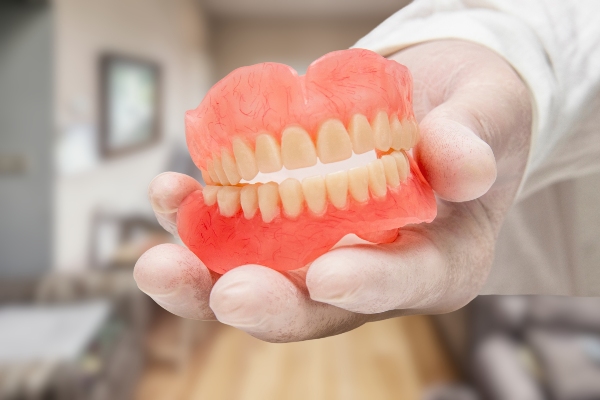When You Should Get Dental Veneers Replaced

Dental veneers are thin shells tailor-made to cover the front surface of your teeth. They dramatically improve your smile and are bonded to the teeth, changing their appearance completely. Eligibility for veneers varies for each person depending on the condition of their natural teeth. Here is additional information on the types of veneers and when they should be replaced.
Types of veneers
There are three types of dental veneers that are used commonly: porcelain, composite, and no-prep. Each option has its own unique advantages.
Porcelain veneers
Porcelain is likely the most common material used for veneers. It is slim and translucent, allowing for a natural appearance. These dental veneers typically last between seven and ten years but can last as long as 20 years if well cared for.
Composite veneers
Resin-based composite is also used frequently for dental veneers. These are known to last about four to eight years. Though they do not last as long, composite veneers are normally less expensive than porcelain.
No-prep veneers
These dental veneers do not require intense prep work to be done to the tooth before they are installed. This helps to preserve your tooth enamel while still improving your smile. Since the process is less invasive, less time is required in the process of applying no-prep veneers than their counterparts. Either a porcelain or composite material may be used with this option, and it is considered mid-range in terms of expense.
Indicators that it is time to replace veneers
Depending on the type of veneer you choose, they are likely to last somewhere between seven and 15 years. Proper oral hygiene and regular dental checkups can help to extend that lifespan. No matter how well cared for veneers are, they are not permanent and therefore eventually will require replacement. You should replace your veneers if any of the scenarios below occur.
Your veneers are chipped or damaged
Materials used for veneers are durable, but can still chip or crack. This is especially true if you experience trauma to your face or mouth, chew on ice, or grind your teeth.
Your natural teeth are unhealthy
If cavities or decay form under your veneers, the restoration can be impacted. The issue will need to be treated with the removal of the veneers in order to deal with the dental problem. Once the decay has been attended to, the material can be replaced on the teeth.
Your veneers are less bright
Porcelain veneers are less prone to showing stains than the alternatives. However, even porcelain becomes less brilliant with time. A drawback to veneers is that they cannot be whitened with products or treatments like natural teeth.
There is a gap between your veneers and gums
Gum disease and inadequate dental hygiene cause gums to recede from veneers. If the edge of your restorations is visible when you look into the mirror, see your dentist to have them looked at. To prevent this to the fullest extent possible, care for your dental veneers properly.
Your veneers feel too big for your mouth
Applying veneers to a mouth takes skill, and dentists who have not been doing it for long may inadvertently make mistakes in fitting them. If yours feel uncomfortable or bulky, call your dentist to see if you may need a better fit.
One of your veneers becomes flexible or slips off
Veneers can become loose or fall off altogether for several reasons. One reason is problems with bonding adhesives, which sometimes lose their strength over time. Other reasons that the wearer can contribute to include bad habits (such as eating sticky foods) and decay of the underlying teeth.
Your veneers are changing colors
Food and drink staining aside, veneers still change color. This is because the hue of the cement holding the restorations in place alters with time. As the adhesive darkens, it will begin to show through the dental veneers. This gives your teeth the appearance of being darker than many people prefer.
Your veneers are rough around the edges
You may believe that veneers are immune to wear and tear, but they are not. They are prone to damage similar to that experienced by your own teeth. They often become rough and worn. When this happens, they will neither look good nor feel comfortable, and you will need to quickly replace them.
Conclusion
Dental veneers are one option for enhancing your smile, but they do not last indefinitely. Consider replacing them when they begin to show signs of discoloration or wear and tear to optimize your smile.
Request an appointment here: https://brimhalldentalgroup.com or call Brimhall Dental Group at (661) 249-1122 for an appointment in our Bakersfield office.
Check out what others are saying about our dental services on Yelp: Dental Veneers and Dental Laminates in Bakersfield, CA.
Recent Posts
Dental veneers transform smiles, boosting patients' confidence by improving their aesthetics. These thin, custom-made shells cover imperfections, such as discoloration, chips, or gaps, and offer a durable solution for enhancing your appearance. However, following specific care routines and working closely with a dentist is vital to keeping veneers looking and functioning at their best. Taking…
Dental veneers are a popular cosmetic dentistry solution that can transform the appearance of your smile. These thin, custom-made shells cover the front surface of teeth, addressing issues such as discoloration, chips, gaps, and minor misalignments. Dental veneers offer a minimally invasive way to achieve a natural, radiant smile, making them an excellent choice for…
Dental veneers are used in restorative procedures. They are thin covers made from porcelain or composite. The covers fit over the teeth to create a traditional and natural-looking smile. People commonly turn to veneers as an option for minor chips or other imperfections in the teeth. Understanding all of the information about veneers is important…
Dental veneers are thin, tooth-shaped covers that are cemented to the front-facing side of teeth. These prosthetics cover any flaws on the surface of teeth, instantly improving the appearance of teeth that are covered with them.Dental veneers are quite popular with cosmetic dentists, and they can be used to fix a wide range of issues…


